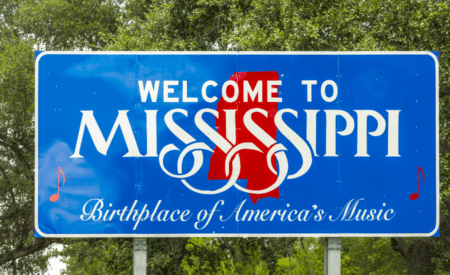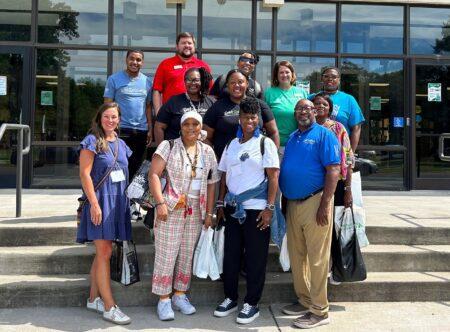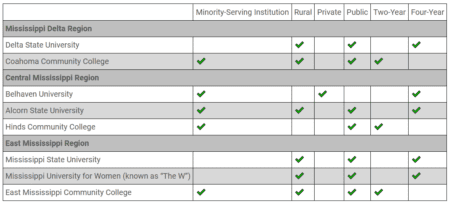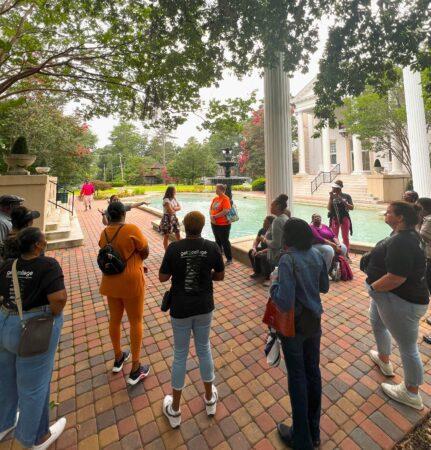How the Sweet Magnolia Bus Tour Supports College and Career Readiness in Mississippi
WHEF’s Get2College Program launched the Sweet Magnolia Bus Tour during the Summer of 2024 to address the need for ongoing education and training to support career coaches and ensure student success.
Published by: National College Attainment Network (NCAN), Elizabeth Wood, Program Fellow
November 8, 2024

In 2022, the Mississippi Department of Education required all high schools in the state to teach a college and career readiness (CCR) course to every graduate. As the pilot curriculum rolled out, Mississippi identified additional strategies to support districts and schools in its implementation. One of them being allocating funding for up to 150 career coaches to be hired and deployed across high schools statewide to help guide the successful piloting of the CCR curriculum. However, this funding did not include provisions for additional CCR training or professional development for teachers and coaches.
The Woodward Hines Education Foundation (WHEF), a National College Attainment Network (NCAN) member and key collaborator in developing the state’s college and career readiness curriculum, recognized the need for ongoing education and training to support career coaches and ensure student success. Counselors and career coaches play a crucial role as the primary source of college information for many high schoolers. As key cultivators of a college-going culture, counselors and coaches hold substantial influence in shaping students’ postsecondary career and educational outcomes. This is especially important when advising BIPOC students, who are often less likely to engage in early college and career advising due to possible interpersonal and institutional biases embedded in standard advising practices. By gaining deeper knowledge of college admissions, campus programs, and educational offerings, these educators are better equipped to provide inclusive advising that effectively supports all students and limits bias.
With support from NCAN’s Innovative College & Career Readiness Project Grant, WHEF’s Get2College Program launched the Sweet Magnolia Bus Tour during the Summer of 2024. This initiative aimed to empower Mississippi educators, counselors, CCR teachers, and career coaches by providing exposure to the state’s diverse higher education opportunities.
Highlighted as an innovative and promising practice for CCR, NCAN spoke with Charlie Herrington & Shannon Grimsley to learn more about the undertakings that led the Get2College Sweet Magnolia Tour to such success so that other organizations can replicate this effort in their own state.
Get2College Sweet Magnolia Tour at a Glance

Sweet Magnolia Bus Tour, 2024
Sweet Magnolia Campus Tour, summer 2024
The Sweet Magnolia Bus Tour aimed to equip educators with valuable career and college advising insights, breaking down stereotypes and biases related to the types, sizes, and locations of Mississippi colleges. By engaging participants in interactive activities and encouraging resource-sharing, the tour provided educators with practical tools to increase students’ awareness of diverse college and career options.
A crucial part of building inclusive and comprehensive advising and coaching practices is understanding the range of available programs across the state. With input from educators, Get2College coordinated with various colleges and universities around Mississippi to create an opportunity to learn more about each institution’s unique program offerings.
The tour visited three regions, showcasing different types of institutions: Mississippi Delta Region (Delta State University, Coahoma Community College), Central Mississippi Region (Belhaven University, Alcorn State University, Hinds Community College), and East Mississippi Region (Mississippi State University, Mississippi University for Women, East Mississippi Community College). In Mississippi, tours were designed to be day tours and were grouped regionally to minimize travel time and maximize engagement with institutions that may have been unfamiliar to educators.

Not Your Typical College Tour
Traditional college tours often involve a standard format: an admissions presentation by excited campus ambassadors, a campus walk and tour, and a special dining hall lunch. For educators, this also includes balancing logistical tasks like tracking students and managing paperwork.
The Sweet Magnolia Bus Tour used a hybrid tour model that prioritized in-depth discussions with the top academic programs at each institution over the usual walking tour, giving educators the chance to network and fully engage with the campus experience.
Securing buy-in from participating colleges was crucial for the success of the tours. Participating colleges, such as East Mississippi Community College demonstrated their commitment by creating an engaging program opportunity that provided demonstrations within their golf management program and having an opportunity to speak with the college’s president. In these spaces, educators were encouraged to ask critical questions so that they had a better understanding of how each institution would best support the students that they serve.
Coordinating with institutions to craft a tailored tour not only supported the Magnolia Bus Tours, but also served as a way for institutions to better assess the kinds of tours that would be effective for different populations.
Prioritizing Feedback, Assessment, and Considerations for Expansion

Sweet Magnolia Bus Tour, 2024
Feedback from the Sweet Magnolia Bus Tours was valuable, as it assisted WHEF in assessing the effectiveness of the program and considerations for the future. Through interviews and surveys, valuable data showed growth in all assessment areas, with the highest growth in overall knowledge and perception of post-secondary options in Mississippi.
“Pretty much everything I thought about all of these schools were dispelled” – Sweet Magnolia Bus Tour Participant
Herrington and Grimsley found that this insight and feedback was valuable for planning future tours and engagement with educators. One of the most important takeaways and indicators of success from the tours was that educators wanted to engage in another tour like this and expressed that they were able to better serve their student populations with the newfound contacts and knowledge from these experiences.
The Sweet Magnolia Bus Tour represents a transformative and innovative approach to college and career readiness in Mississippi, providing educators with essential knowledge, resources, and connections. By prioritizing exposure to diverse institutions and tailoring tour experiences to meet educators’ needs, WHEF and Get2College created a sustainable model for supporting students’ postsecondary pathways. Feedback from bus tour participants has highlighted the tour’s success in shifting perceptions and deepening insights into Mississippi’s higher education landscape. This approach not only empowers educators to guide students more effectively but serves as encouragement for other states to replicate and adopt similar initiatives, creating a ripple effect that can enhance career and college readiness nationwide.
Interested in organizing a college bus tour in your area?
Tip One: Visit Diverse Types of Colleges and Universities – Exposure to various college types helps educators understand how different institutions can support students’ goals and aspirations. When planning a tour, consider visiting different types of institutions. Each offer unique post-secondary opportunities and experiences. Also consider the logistics of travel, time of year, and select colleges that are not far apart from each other. This ensures that educators can spend adequate time at each location and have an enriching experience at each.
Tip Two: Identify and Engage Key Departments, University Programs, and Campus Partners – In planning a campus tour, identify key departments and university programs on campuses to partner with for presentations, resource sharing, and networking. This could include program directors, admissions staff, and even college presidents. Be specific in your request for the kind of tour that would benefit your group the most, not just the standard admissions talk and walk. By creating opportunities for these colleges and universities to showcase their programs and answer pressing questions from educators, this tailored approach ensures that participants leave with valuable contacts and actionable next steps to better serve their various student populations.
Tip Three: Develop A Tailored Assessment Tool and Incorporate Feedback – Developing a tailored assessment tool (e.g. survey, interviews) allows organizations to get valuable insight into the effectiveness of their program. Starting with a pre- and post- assessment will allow you to assess areas of growth and areas to improve upon in future bus tours. Having an effective assessment tool will also allow your organization to leverage the results for further buy-in from key stakeholders.